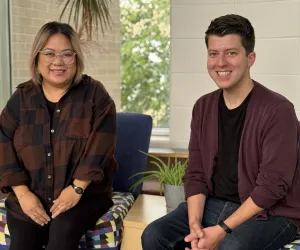With FAFSA completion rates down due to glitches and delays in the roll-out of the new Better FAFSA, Achieve Twin Cities worked hard to boost these numbers over the summer by providing additional FAFSA guidance for Minneapolis Public Schools (MPS) and Saint Paul Public Schools (SPPS) graduates. This hands-on support was made possible by generous state and federal resources and the dedicated work of our career and college readiness coordinators Tina Kue from MPS North Community High School and Colin Peters from SPPS Washington Technology Magnet High School.
Throughout the summer, Tina and Colin cast a large net to catch as many new graduates as possible to help ensure they could secure financial aid in time for fall postsecondary enrollment. “We provided FAFSA support through a variety of opportunities,” says Colin. “We were hyper-focused on FAFSA workshops, one-on-one advising, resource materials, drop-by FAFSA help sessions and responding to calls on a dedicated hotline for students and families. We also scheduled in-person appointments at public libraries during the day and evening and additional time for drop-by appointments. Students and parents had a lot of anxiety surrounding the FAFSA, and it felt good to help relieve their stress.”
“We had to be as flexible as possible on dates and times to accommodate many different schedules,” Tina adds. “Parents provide critical income information that must be included in the FAFSA and it’s often hard to reach them during daytime hours. Their participation is especially important because more students can go to college when their parents are available and willing to share this information.”
With this additional support, 247 additional FAFSAs were completed by MPS and SPPS students and recent graduates over the summer. From June through August, Tina, Colin and other Achieve coordinators met with 322 students and graduates and had 442 individual FAFSA-focused engagements with these young people.
The drop in FAFSA completion has particularly compounded existing barriers for students of color and lower income students, and will likely have a significant impact on postsecondary enrollment this year. Concern over this potential impact led the Minnesota Office of Higher Education and the U.S. Department of Education’s FAFSA Student Support Strategy to provide additional resources to organizations like Achieve Twin Cities for summer support. Federal funding prioritized organizations like Achieve that partner with schools and districts and have deep ties to students and families.
Tina notes that for many low-income students, getting financial aid means they will be going to college, and often they are the first in their families to do so. She also points to the value of meeting with students one-on-one and helping them build greater skills in completing the FAFSA. “I inform families that the FAFSA must be submitted every year their student plans to go to college, so it’s important that they remember the steps we completed together at our appointment. I also tell them to take a photo of their FAFSA logins and passwords and put them somewhere safe for the following year. This work is so important, and students walk away feeling confident about the FAFSA process.”
Tina also says there has been a misconception that students can only fill out the FAFSA after they’re accepted to the college of their choice. In reality, because many students rely on financial aid to afford college, the earlier they complete their FAFSA and get access to aid, the better. “If they don’t complete the form in advance, they may miss out on aid money and scholarships, including those awarded from their college of choice," she says. Colin agrees. “It’s imperative to submit the FAFSA application to be eligible for all scholarships, including the new Minnesota North Star Promise, which provides free college tuition at all Minnesota State colleges, University of Minnesota campuses and tribal colleges for lower income families. That’s why we worked so hard this summer to increase completion rates.”
Colin says the greatest reward for providing FAFSA support over the summer is seeing the impact of this work. “Students and parents came to me at different parts of the process, and I helped some families from start to finish. I saw the relief on their faces when they learned they would get the financial aid they needed to make college possible.”
With the start of the new school year, the full Achieve career and college readiness team is back providing FAFSA support to students in 27 Minneapolis and Saint Paul high schools. “I love working with young people and seeing their growth, change and accomplishments,” says Colin. “They are talented, bright students, and completing the FAFSA can change their future trajectory. This is a key step towards achieving their goals and dreams.”
We're so thankful to Tina and Colin for providing extra support for our students and their families this summer. And our best wishes to all of our Minneapolis and Saint Paul graduates who are beginning college and other opportunities this fall!
Learn more about Achieve’s FAFSA support work in Minneapolis and Saint Paul Public Schools and find your MPS or SPPS school career and college readiness center.
